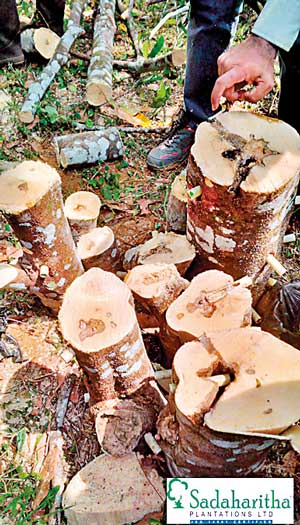29 Feb 2016 - {{hitsCtrl.values.hits}}
Wallapatta is scientifically classified as a sub-canopy tree growing in our wet zone forests. It creates a scarce resin called agarwood in its core due to a reaction to a fungal infection or any other external factors.

However, not all wallapatta trees are affected or contain the fungi that results in the agarwood resin.
Sadaharitha Plantations Ltd, the pioneer and the leader in the importation of seeds, production and the harvesting of agarwood up to the final exporting process, condemns the indiscriminate and rampant felling of wallapatta trees for quick profits, emphasizing the need to protect and preserve the plant.“Due to the lack of expertise and technology, offenders are felling entire forests just to find a tree or two. Hence, this has caused much commotion among the public as well as contributed towards the destruction of natural forests,” noted Sadaharitha Plantations Ltd Chairman Sathish Navaratne.
Additionally, most of the natural trees are situated in protected government property and forests. Due to the ongoing destruction in natural forests only 1-2 percent of these trees are in existence.
Sadaharitha has constantly warned the public about dubious new methodologies and harvesting techniques being advertised for the use of agarwood production.
In comparison, the technology developed by Professor Robert Blanchette of the University of Minnesota and currently used by the company, contributes towards the production of agarwood in an efficient, clean and sustainable manner, reaping rich dividends.
“There are many new methodologies and harvesting techniques found in the world every day. However, once it is registered, it is imperative they get permission where the technology is patented,” he noted.
Navaratne also draws attention to the highly successful agarwood harvesting trials recently completed. He says, “The CA-kit, invented by Professor Robert Blanchett from the University of Minnesota of the United States, has so far proven to be the best method to produce agarwood on a commercial scale in the aquilaria trees.” He emphasised the efficacious nature of the technology noting, “This technology is the best as it produces the optimum quality of agarwood (dark and high in concentration), providing about a 60-70 percent growth of agarwood inside the entire tree bearing good results and high return on investment for our clients.”
Navaratne also reiterated, “Currently in Sri Lanka we have the exclusive right to use and sell this technology. We import the kit from a registered production facility in Vietnam.”
As a responsible corporate entity, Sadaharitha has continuously devoted considerable resources towards the development of agarwood. “Since 2010, we have researched every possible method, both traditional and modern, for harvesting agarwood from these trees. As we found the CA-kit method best for commercial growth and as an investment opportunity we bought the exclusive rights for this technology,” he added.
The company’s responsibility also extends towards warning potential customers not be misled by unscrupulous elements offering agarwood investments with the promise of short-term returns.
He noted, “No other method produces agarwood to the scale the CA-kit does. Thus, investors face a dilemma towards the end when their investments don’t pay off. They only realize that they were conned or fallen into a trap at the end of the six to eight years.”
Whereas when investing with Sadaharitha, the company prides itself on the ability to “bring down good quality seeds, plant and sell it in good condition. So, if anyone is offering cheaper prices, the people must be wary and should ask themselves whether this is at all possible,” Navaratne added.
Moreover, the company follows a stringent quality process in all its production processes. He said, “In our nursery, we separate the best plants we have chosen; the best seeds from the best mother trees as we want the best for our investors.”
30 Nov 2024 17 minute ago
29 Nov 2024 29 Nov 2024
29 Nov 2024 29 Nov 2024
29 Nov 2024 29 Nov 2024
29 Nov 2024 29 Nov 2024